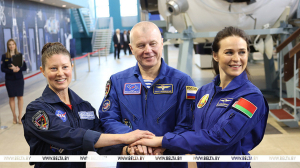Ru
|
Eng
SPECIAL REPORT: ‘We feel support, trust the commander.’ How Marina Vasilevskaya passed a space exam
28.02.2024

Belarusian women are getting closer and closer to the outer space. A pass/fail comprehensive training session of the main crew of the 21st visiting expedition to the International Space Station (ISS) took place in the Cosmonaut Training Center in Zvyozdny Gorodok, Moscow Oblast on 28 February. The crew composition is international: the Roscosmos cosmonaut Oleg Novitsky, the NASA astronaut Tracy Dyson, and Belarus’ Marina Vasilevskaya, who will fly into the outer space together with the experienced colleagues in late March. Both Oleg Novitsky and Tracy Dyson agree that Marina Vasilevskaya has finished the training process with flying colors and will become an upstanding member of the flight team. The flight is expected to last for slightly less than two weeks. But even 12 days in the orbit require months of exhausting training. Not to mention the fact that it will be a historic event for Belarus without a shadow of a doubt. BelTA reporters once again visited the Cosmonaut Training Center and found out what exams cosmonauts have to pass.














“We don’t know what abnormal situations have been prepared for us”
Why is a cosmonaut exam interesting? At least because the students themselves do not know what to expect. It is organized in the following manner: a commission and cards with tasks. The tasks include all kinds of abnormal situations, which cosmonauts may theoretically encounter. After that the crew enters the simulator, which is designed to resemble a section of the International Space Station and the exam begins inside it.



“We don’t know what abnormal situations have been prepared for us. Only the commission knows them. We learn about them only during the training process. I believe I have a small edge thanks to previous flights. Apart from that, Tracy has experience of space flights. Marina is going through the training process excellently. This is why I feel psychological and moral comfort,” the crew commander Oleg Novitsky said the day before the training session.
“We feel strength and support and completely trust the commander”
Although it was the first time Marina Vasilevskaya had to go through the space exam, the girl looked completely confident in her abilities: she smiled and showed no trepidation. According to Marina, the crew work smoothly and completely trust their commander Oleg Novitsky. “I fully support the commander’s words. We work smoothly. The crew is very experienced. We feel strength, support and fully trust the commander,” Marina Vasilevskaya assured.

While talking to reporters, the girl also noted that she would call her mother first thing after landing. Although the mother will learn her daughter has landed without any calls, Marina is convinced: “Certainly, mom keeps an eye on my training process. Belarusian mass media cover it. This is why everyone is up to date. I think mom will not miss the moment of my landing.”

“A fantastic, cheerful, experienced crew”
This is how the NASA astronaut Tracy Dyson described her fellow cosmonauts. Tracy believes that collaboration and teamwork skills are essential for successfully passing the exam.
“Marina Vasilevskaya is very energetic. It is obvious that she is focused on training. I am also confident in Oleg Novitsky’s competences,” Tracy Dyson said.

Tracy Dyson added that as quite an experienced cosmonaut she had already shared useful tips with her Belarusian colleague. “But the most important rule is for us to work confidently and calmly,” the NASA astronaut is convinced.
“Tight schedule is the most complicated part of the space flight training process”
“Tight schedule is the most complicated part of the space flight training process. Cosmonauts spend quite a lot of time training for their first flight: about five or seven years. Marina and Anastasia [Lenkova, a backup crew member from Belarus] are doing great. They coped fast and are working very hard,” said Tatiana Danyuk, a comprehensive training instructor of the Russian segment of the International Space Station.
Today’s exam lasted for four hours although it usually takes eight, Tatiana Danyuk added. “But the crew is supposed to complete fewer tasks, this is why the time was reduced. Apart from that, we didn’t overload the crew with emergencies. We expect the commander to deal with all the non-routine situations regardless of what crew members are affected. The exam involved only two situations: one involving an onboard system and another one involving an emergency such as fire or loss of pressurization,” she concluded.





“It feels as if an elephant stepped on my chest”
The reporters also saw the centrifugal machine, which had been used to train Belarusian women cosmonauts. Passing the centrifuge is supposed to be the most complicated test for space flight candidates. But Irina Konovalova, a functional diagnostics doctor of the 40th department in the 1st lab, believes that a person, who passes all the previous stages in the course of the space flight preparation process, will most likely pass the centrifuge test. However, it still remains a complicated test.



“It is true it is the most complicated test. But I always tell guys: if you have reached the centrifuge stage, it means your health is fine. And the probability of the person joining the cosmonaut corps stands at 99.9%,” Irina Konovalova said.
The ability to pass the centrifuge test is affected by various factors such as weight. The lesser you weigh, the easier time you will have in the centrifuge. Because the centrifuge increases the body weight by a certain multiplier. In other words, it can pressure the human body with the force of the body weight multiplied by up to eight times. “You can multiply your weight by eight times to understand how much force you will feel. Some say it feels as if an elephant stepped on their chest,” Irina Konovalova mentioned an example.
SCIENCE. TECHNOLOGY. INNOVATIONS
13.08.2024
28.06.2024
28.06.2024
25.06.2024
05.06.2024
15.05.2024
15.05.2024
26.04.2024
26.04.2024
26.04.2024













